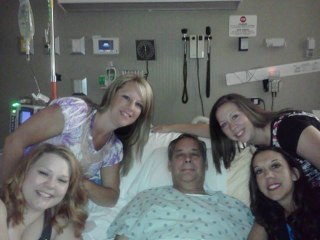Oct. 2, 2013 at 8:56 AM ET
When a neurosurgery patient died from a rare and fatal brain disorder at a New Hampshire hospital this summer, it sent a ripple of panic across the region, particularly for 15 people warned that they may have been exposed to Creutzfeldt-Jakob disease through contaminated hospital surgical equipment. Everyone wondered who might spread this dire bug, and who might be at risk.
But families of others who have suffered — and died — from the little-known but invariably deadly disease say that reaction is only the beginning of the fear, discrimination and rejection that CJD patients face.

Courtesy Karen Bailey
Jerry
Bailey, 64, lies in a Utah hospital in August, surrounded by his
daughters, Amanda Bailey, Raelynn Miller, Nichole Bailey and Stephanie
Rathbone. The Boise, Idaho, man died five weeks later of
Creutzfeldt-Jakob disease, a rare and fatal brain disorder. His body was
rejected by four funeral homes and a crematorium out of fear of
infection, family members said.
“It happens a lot,” said Robert Kassai, a New Jersey funeral director who also sits on the board of the CJD Foundation, an advocacy group. “There are many, many instances where families call me saying they’ve been turned away.”
Some families report that their loved ones who died from CJD were removed from the hospital, placed in double body bags and taken directly to a crematorium with no warning. Others tell NBC News that funeral workers forced pallbearers to wear medical gloves and told mourners to stand far back from the gravesite and to disperse quickly after the ceremony.
“The funeral issue is the bane of our existence, basically,” said Florence Kranitz, president of the CJD Foundation. “They get people at their most vulnerable, when they’ve been hit by the freight train of this disease.”
CJD is very rare — with about one death per million people worldwide each year. But Kassai estimates that dozens of the estimated 300 people in the U.S. who annually die from the degenerative brain disease are rejected by the people in charge of final disposition.
That was the case for Amanda Bailey of Ogden, Utah, whose 64-year-old father, Jerry Bailey, died Sept. 18, just four months after exhibiting the first signs of CJD. Typical symptoms include memory and cognitive problems, vision problems and, later, trouble walking and speaking.
After his devastating decline, Jerry Bailey’s remains were rejected by four Salt Lake City funeral homes and a crematorium, she said.
“They wouldn’t even cremate him because they worried that the spores would become airborne,” said Bailey, 27. “They apologized and said they were sorry, but they didn’t want to risk the health and the safety of the people there.”
Never mind that CJD is caused not by spores but by prions, virus-like proteins that manage to transform other proteins into disease-causing shapes. Like most patients, Jerry Bailey had sporadic CJD, which occurs spontaneously, with no known cause or cure. It’s not the variant form of the disease that causes a human form of “mad cow disease,” associated with eating beef.
And never mind that infectious disease experts say that the prions, though hard to kill, don’t spread easily and not through the air or through ordinary skin contact. It takes injection, transplantation or even consumption of the tainted tissue to cause infection.
“’There’s no known actual risk. Morticians are in no more danger at all than anyone else,” said Dr. Richard T. Johnson, a CJD expert and a neurology professor at Johns Hopkins Medicine, in Baltimore, Md.
Read More Here
****************************************************
Fatal rare brain disease confirmed in N.H. patient; 15 possibly exposed
Sep. 21, 2013 at 1:04 AM ET
A
neurosurgery patient treated at a New Hampshire hospital this spring
did have a rare brain disorder known as Creutzfeldt-Jakob Disease,
health officials confirmed Friday. That means that 15 other people in
three states may have been exposed to the invariably deadly infection
through potentially tainted surgical equipment.Autopsy results came back positive for CJD from the National Prion Disease Pathology Surveillance Center and were reported to the New Hampshire Department of Health and Human Services and Catholic Medical Center, where the surgery took place.
Earlier this month, New Hampshire officials notified eight patients who may have been exposed to CJD through shared equipment. Five others in Massachusetts and two in Connecticut were also warned of the risk, health officials in those states said.
"Though we are not surprised by the test results, we are saddened by the toll this disease takes on families and our sympathies go out to all those affected," said Dr. Jose Montero, New Hampshire's director of public health, in a statement. There is no way to confirm the disease except through autopsy after a patient's death.
The initial patient turned out to have sporadic CJD, which occurs spontaneously. It's not the variant form of the disease that causes a human type of "mad cow disease" and is associated with eating beef contaminated with the cattle version of the infection, called bovine spongiform encephalotpathy, or BSE, experts said.
The problem arose because standard hospital disinfection techniques cannot eradicate the prion that causes CJD. A prion is a protein and the type that causes BSE and CJD is misfolded and somehow manages to transform other proteins into disease-causing shape.
The initial patient had surgery at Catholic Medical Center in Manchester, N.H., where eight others were also treated. The five Massachusetts patients underwent surgery at Cape Cod Hospital in Hyannis, while the two Connecticut patients were treated at the Veterans Affairs Hospital in West Haven, health officials said.
Read More Here
****************************************************









No comments:
Post a Comment
Hello and thank you for visiting my blog. Please share your thoughts and leave a comment :)